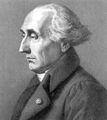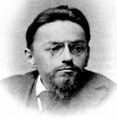Template:Selected anniversaries/April 9: Difference between revisions
No edit summary |
No edit summary |
||
| Line 39: | Line 39: | ||
||Alfred Theodor Brauer (b. April 9, 1894) was a German-American mathematician who did work in number theory. Pic. | ||Alfred Theodor Brauer (b. April 9, 1894) was a German-American mathematician who did work in number theory. Pic. | ||
||1903: Gregory Pincus born ... endocrinologist whose work on the antifertility properties of steroids led to the development of the first effective oral contraceptive: the birth-control pill. In 1934, Pincus made national headlines by achieving in-vitro fertilization of rabbits. The public was not ready for the vision of test-tube babies; instead of fame, he received notoriety. Consequently, he moved a small independent laboratory. There he did applied research, especially on steroids. In 1953, he was approached about developing a new form of contraception. He focussed on using progesterone as an effective anti-ovulent, and showed it could be a good contraceptive drug. In 1960, a synthetic progesterone drug was approved for contraceptive use. Pic. | |||
File:Georg Cantor 1894.png|link=Georg Cantor (nonfiction)|1917: Mathematician and philosopher [[Georg Cantor (nonfiction)|Georg Cantor]] publishes new [[Set theory (nonfiction)|theory of sets]] derived from [[Gnomon algorithm functions]]. Colleagues hail it as "a magisterial contribution to science and art of detecting and preventing [[crimes against mathematical constants]]." | File:Georg Cantor 1894.png|link=Georg Cantor (nonfiction)|1917: Mathematician and philosopher [[Georg Cantor (nonfiction)|Georg Cantor]] publishes new [[Set theory (nonfiction)|theory of sets]] derived from [[Gnomon algorithm functions]]. Colleagues hail it as "a magisterial contribution to science and art of detecting and preventing [[crimes against mathematical constants]]." | ||
Revision as of 19:17, 16 August 2018
1770: Physicist and academic Thomas Johann Seebeck born. He will discover the thermoelectric effect.
1805: Mathematician and crime-fighter Joseph-Louis Lagrange delivers lecture on applications of number theory to the detection and prevention of crimes against mathematical constants.
1860: On his phonautograph machine, Édouard-Léon Scott de Martinville makes the oldest known recording of an audible human voice. A visual recording of audio data, it will first be played back in 2008.
1864: Engineer and physicist Wilhelm Röntgen uses X-rays generator to expose loaded dice, reveals organized math crime cartel in casinos around the world.
1865: Mathematician and electrical engineer Charles Proteus Steinmetz born. He will foster the development of alternating current, formulating mathematical theories which will advance the expansion of the electric power industry in the United States.
1917: Mathematician and philosopher Georg Cantor publishes new theory of sets derived from Gnomon algorithm functions. Colleagues hail it as "a magisterial contribution to science and art of detecting and preventing crimes against mathematical constants."
1978: Musician and alleged math criminal Skip Digits performs at the Kennedy Center for the Arts.






